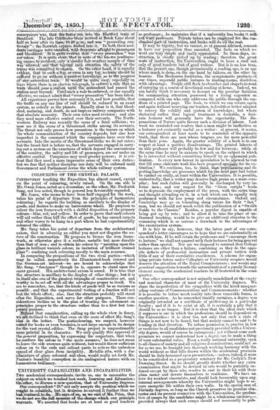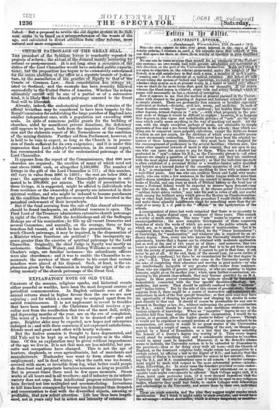UNIVERSITY CAPABILITIES AND /NCAPABILITIES. Two academical correspondents, invite us, one
to reconsider the, subject on which we touched last week, Learning and Education ; the other, to discuss a new question, that of University Degrees. Our correspondent "It." not only accepts' the position which- we sought te establish, but is desirous toexteml it fuetber than we had. ventured, to do. Ile says.of us, as we said of Mr- Price, that. we, do not see the full message of the change which our principle. warrants. We asserted that books are at least as good teachers as professors;, he maintains that if a. university has books not rant' professtnf.• • Private tutors can be employed for. the. mar cha,uieal part of itistauCtion, and books.will do all, the reek
It may be bightly; but we cannot, as at pwent advised, consent
to have our preposition thus amended. e facts on which we went arni4y.itaiiple and easily appmeiated, In thesedays, in- struction ie. chiefly picked up by reading: therefore, the great- seats of instruction, the Universities, ought to have a stall not only of goad teachers but of good writers. But it is no less trials that the, present age, though, prominently a reading age, is an age whom much is dine, on tilt:, one hand by talkers, on the other by- hearers. The Atechanies Institutes, the symptomatic product:11.4 our; times, suporadd public lectures, to reading-rooms, doubtless, with advantage. People still flock to churches and ch of carrying on a course of devotional reading atrhome. Indeed, we eau hardly think it necessary to descant on the peculiar facilities. for, commending, attention, possessed- by a living expositor as. compared with one who,ouly addresses the public through the me- dium of a printed page. The book, to which we can return again and ageia without wearying our teacher, is doubtless betterteal to convey the solidity and system, of knowledge • but w rhetorical rather than logical treatment is desirable, a firAt- rate- lecturer will generally have the, superiority. The dis- pensations of Nature quite favour such a division of labour.. Laat week we reminded our readers that a man might be ineffective as a lecturer yet eminently useful as a writer : at present, it scene, our corresponded at least needs to be reminded of the oppesite truth,, that there are man whose tongues, are fax more powerful than their pens. .Aga„, the greater solidity of a, book is tuotte respect at least a positive disadvantage, The printed labours, of enable professor will probably be few and far betweeff; while at the same time he may be auluoue to speak on the subjeet in which he is interested without committing himself by an epbenteral pub:, lieetioes Is every new heresy in speculation to be allpwed to run riot till some elaborate work has been prepared specially, fur its ex, tinetiea? We continue, too, to think Omt populorming mid di- gestingknowledge areproceeses which for, the most part had better. be curial on orally, at leastwithin theVoiversities, It is poesibla, undoubtedly, that a writer may deserve high praise us a mere. con. piler ; but sueleduties, will generally be discharged by very in, feriar men:; and our respect for the " liters soripta " leads, us to deprecate the employment of the prose, with the extra time and thought attending on it, in a task which can be equally well perferraed with far less pomp and circumstance. Oxford and, Cambridge may go on tolerating slang tutors for their "fast" mem but we should not much relish the publication of a " Swell's Guide to the Classics." Besides, a popular digest is capable of being got up by rote ; and to Llow it to take the place of au- thorized- teaching, would be to give an additional stimulus to the cramming which is. so serious a drawback to the advantages of the examination system.- It is fair to say, however, that the latter part of our corre- spendeas letter entourages us to hope that we are substantially at one with him. If he will retain the professors and "encourage them to lecture," we shallnot quarrel with their lectures; for being general rather than special. Nor are we disposed to contend that College lectures are other than a failure, combining as they do the oppo- site defects of professorial instruction and private tuition with little if' any of their correlative excellences. A scheme for organ- izing private tutors under Collegiate or University auspices would deserve the attention of the Royal Commissioners ; nor would any practical suggestions towards the naturalisation of a purely literary element among the academical teachers be ill bestowed in the same quarter. Our other carrespondent is not unjustly scandalized at the empty and nominal character of most of the University degrees. We share the imperfection of his sympathies with the hired masquer- ading costume of Commemorations; mid Commencements : whether it is possible to infuse much reality into these venerable forma, is another question. As he somewhat timidly surmises, a degree was originally intended as a certificate of proficiency in a parUcele,r faculty ; and if it is to exist at all, it is certainly a pity that it should be so no longer. But it is (dear that the ideal state which it suppose& is one in which the professions should be depeadea the Universities : it is clear too, not only that such a state of. things is not now to be found, but that society cannot be said to he, tending in that direction. To refuse permission to practise in_ law or medicine to all candidates not previously provided with,a. Univer- sity-degree, would of course be outrageous ; yet without some swill premium we cannot understand how a degree can be made a thing, of very substantial value. Even a really national university, open to-all classes of society and el' religious denominations; could not so-, far as we see, be brought into thorough working harmony with the, world without so that bills drawn within the acadermealprecinct*. should be duly honoured upon presentation,—unless, indeed, it were, to be constituted as a preparatory seminary for Mr. Carlyle's New, Downing Street. So we should, greatly doubt whether any extra examination that might be devised in arts would be patiently en- dured except by those who resolve to cast in their lot with their
alma mater and devote themselves. to residence. We have no love for resident sineeurists, and should look favourably upon any
internal arrangements whereby the Universities might hope to se- cure energetic life within thew own. walls. In the special, ease of Diyinity degrees, Below- ae, the Church preserves its peoulisr ehae raaterand its; resent eounexioa with thc..tiniveraitiee, the pratlutb. tion otessaya the email:Wes might beg wholesome, exerettei-- provided always that such essays should not necessarily be pub- liahed. But a pro sal to reviitliaraidi494'110$41t4M441 1100..i 800:03 . ts. us.. 4 ivt:Mitait_itheitsiowoutlye low* d age, and calculated "to divereatteiitiOn freitab.AVANAlitim nolturallanclqatateoeongpitiallyr 25C101;! • . . ::14)1I3141119 lrillay*IT'



























 Previous page
Previous page